Iranian Cities Facing Water Rationing As Drought Continues

Water reservoirs in Iran are at an all-time low, threatening nationwide rationing soon, due to years of drought and resource mismanagement, local media and officials say.

Water reservoirs in Iran are at an all-time low, threatening nationwide rationing soon, due to years of drought and resource mismanagement, local media and officials say.
Khorasan daily says the water storage of 10 important dams have decreased 25 to 75 percent in comparison to the past years.
Seventy days into autumn, statistics show that the level of precipitation has been extremely low in different provinces of Iran.
Amid popular protests and the ado for the World Cup a report on social media went unattended within the past few days: “Tehran’s dams only have water for a few days.”
Mohammad Baqerzadeh in a report on Etemad daily December 1 says if there is no drastic improvement in the situation, rationing of water would be implemented in some cities.
He says the water level at five major dams around Tehran have almost decreased 50 percent and now around half of people in the capital have turned to underground water extraction.
Firouz Qasemzadeh, a Spokesperson of Iranian Water Industry says in comparison with the long-term average of the past fifty years, there has been a 16% decrease in rainfall across Iran.
An inefficient agricultural sector, over-grazing of rangelands and forests, aggressive over-extraction of groundwater resources, and most importantly the regime’s mismanagement are among the main causes of water bankruptcy in Iran.
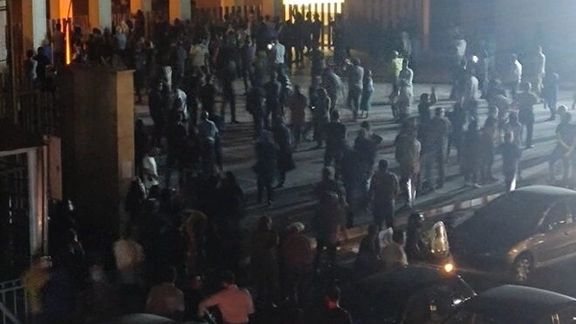
Despite repeated denials by IRGC's Fras news agency about a recent hack of its data servers, Iran's judiciary has started an investigation into damaging leaks.
Prosecutor General of Tehran Ali Alghasi-Mehr said on Wednesday that the probe into the cyberattack against Fars news, a cultural propaganda machine with close links to Iran’s Revolutionary Guard, is because a significant database of personal information of journalists and employees has been leaked.
However, it seems that the investigation has been launched because the authorities are not sure what has been hacked and what database has been breached.
A new word has been coined to refer to the large amount of data leaked from the hack: Farsgate.
A 123-page document, a copy of which Iran International obtained, is among the material the hacktivist group Black Reward uncovered. The document which includes both hearsay and excerpts from domestic and foreign-based Persian media was made in one copy only for the eyes of the IRGC chief commander Hossein Salami. Earlier in the week, Black Reward also released some audio files from a meeting between Qasem Qoreyshi, the deputy commander of the paramilitary Basij and media representatives.
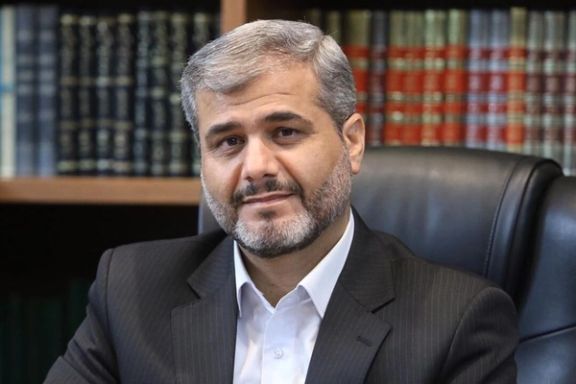
Black Reward announced on Friday, November 25, that it had attacked the database of Fars News Agency claiming that it deleted nearly 250 terabytes of data from all the servers and computers of the website and obtained confidential bulletins sent by the news agency to the office of the Supreme Leader Ali Khamenei. The report revealed a lot of recent orders by Khamenei about the ongoing protests that have engulfed the country since mid-September following the death of the 22-year-old Mahsa (Jina) Amini in the custody of morality police. Now, after several batches of information were leaked to the media, the authorities have started a damage control campaign to seize back the narrative, as most of the data prove that the Islamic Republic is frustrated and weary over its inability to end the protests.
The secret reports also revealed that most Iranians are getting ready for a revolution in the country as the popularity of the regime has dwindled, even among those considered supporters of the Islamic Republic. According to the documents, the level of dissatisfaction is so high that Khamenei has ordered some fundamental change in the structure of the regime in order to prevent a collapse.
The reports came as the protests in the country show no sign of ending and the movement has been spreading at universities and turning into strikes of employees in the industrial and services sectors, such as truckers.
While Iranian universities have turned into a battleground for antigovernment protests, students and professors in more than 150 universities around the world held events in support of the protests in Iran.
Meanwhile in Iran, Rasoul Jalili, the president of Tehran’s Sharif University of Technology, said on Wednesday that the university has increased its security staff by recruiting forces from private security companies. The measure is probably aimed at silencing those who criticize the university for allowing government security forces – especially the IRGC’s Basij paramilitary forces – to enter the campus to crack down on student rallies and sit-ins. If the measure proves successful, it can serve as a model for other universities to clamp down on students.
While Iranians have planned to hold three days of nationwide protests next week – 5-7 December – strikes by employees of industrial factories and truckers have injected fresh blood to the uprising.
Truck drivers and owners in several cities such as Esfahan, Bandar Abbas, Qazvin, and Kermanshah as well as many other western cities refrained from moving goods in support of the protests and strikes by industrial workers. Many people on social media describe the strike by the truckers as a significant blow to the Islamic Republic since it has the potential to cripple the economy. Some people say, “the truckers are leading the revolutionary uprising.”
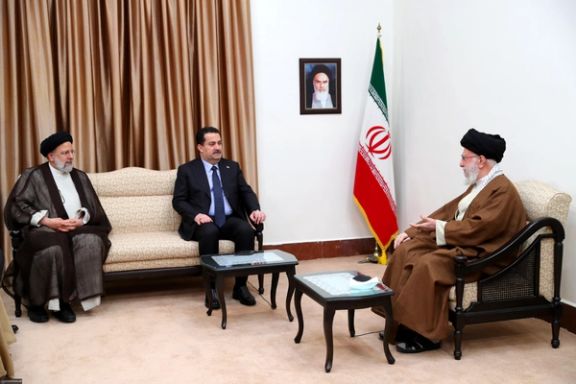
Supreme Leader Ali Khamenei has stressed the need to implement agreements signed between Iran and Iraq, admitting that most of such deals were never implemented.
During a meeting with visiting Iraqi Prime Minister Mohammed Shia' al-Sudani in the capital Tehran Tuesday, Khamenei said numerous deals or memorandums were inked between Tehran and Baghdad, but they were rarely implemented. He especially called for moving towards action on projects in the fields of trade cooperation, transit of commodities and railroad transport.
The Islamic Republic is known to have announced signing deals and contracts whenever officials from other countries visit but most of such announcements are never followed up or result in any tangible operations. Many figures are usually announced but when scrutinized they turn out to be fake or mere estimations.
On Wednesday, board director of the Iranian Oil, Gas and Petrochemical Products Exporters’ Association, Hamid Hosseini, announced Tehran and Baghdad have concluded a $4 billion contract in the field of exporting technical and engineering services. However, the official added that “In the eight months of this year [beginning on March 20], exports to Iraq, except for electricity, totaled $4.7 billion, down by $1.4 billion compared to the same period last year.” It is expected that Iran exports to Iraq will reach $8-9 billion, Hosseini claimed, in the remaining four months.
Iraq has been Iran’s second largest trading partner after China, importing natural gas, but US banking sanctions on the Islamic Republic have made it difficult for Tehran to receive payments. Every now and then, the Islamic Republic claims that it has received its funds from Iraq. Payments for Iran’s gas and electricity imports by Iraq go to a special account in the state-owned Trade Bank of Iraq. Iran can only use the money for humanitarian commodities. The amount of money frozen in Iraq banks was over $6 billion in September, most probably the amount has grown since then.
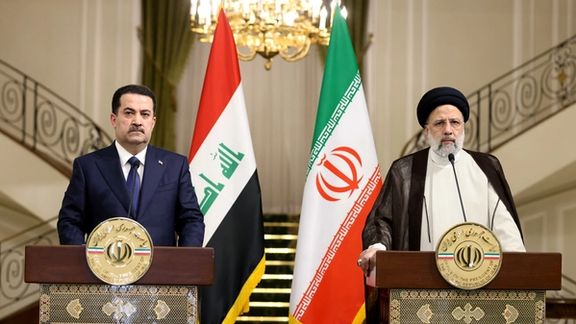
The Iranian Oil Ministry also announced Tuesday that it has opened an office in Iraq. Oil Ministry’s special envoy to Iraq Seyyed Abbas Beheshti said that the mission will help facilitate the implementation of joint energy projects between Iran and Iraq. “This office was opened in the city of Baghdad for the purpose of promoting cooperation and synergy, especially in the implementation of joint oil, gas and energy projects between the two brotherly countries,” he added. Two other Iranian Oil Ministry missions will also open in oil-rich regions of Basra in the south and in the semi-autonomous region of Kurdistan in northern Iraq, he said.
According to a recent article by a newspaper in Tehran, Iran has lost $450 billion in oil revenues in a decade because of international and US sanctions. Aftab News website based its calculation of lost revenues on OPEC’s annual oil export numbers and estimated that UN Security Council sanctions that came into play a decade ago and lasted more than 3 years, followed by US sanctions since 2018 cost Iran dearly.
President Ebrahim Raisi and his oil minister claim that Iran has increased oil output and exports to pre-2018 levels when former US president Donald Trump withdrew from the 2015 nuclear deal with Iran and began imposing sanctions on Iranian oil exports.
Iraq’s oil ministry said earlier in the year that it exported $11 billion of oil in March, the highest level for half a century, as crude prices soared in the wake of Russia’s invasion of Ukraine. Iraq’s record shipment of crude caught the attention of several Iranian pundits who drew attention on social media to Baghdad’s success, while Iran is still hampered by United States sanctions. The ministry said that the country exported "100,563,999 barrels for revenues of $11.07 billion, the highest revenue since 1972". This makes Iraq’s daily shipments three times more than Iran’s clandestine exports.
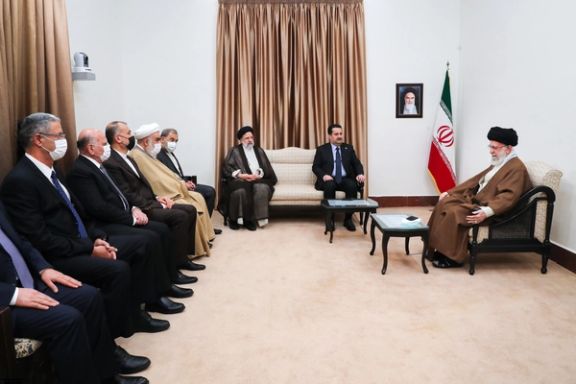
Al-Sudani's accompanying delegation includes Foreign Minister Fuad Hussein, veteran oil minister Hayan Abdulghani and Qasim al-Araji, a former interior minister and current national security adviser. This is the first visit by the new premier, who assumed office late in October. The visiting Iraqi officials held several meetings Tuesday, including with President Ebrahim Raisi. Al-Sudani and his delegation traveled to the religious city of Mashhad Wednesday.
The new prime minister has already visited to Jordan and Kuwait and is set to visit Saudi Arabia later in December. His visit to Iran was aimed at consolidating Baghdad’s ties with Tehran.
In September, the head of Iran-Iraq Joint Chamber of Commerce, Jahanbakhsh Sanjabi Shirazi revealed that contrary to the government's claim, Iran's exports to Iraq have decreased in the past five months, 8 percent in terms of value and 28 percent in terms of weight.
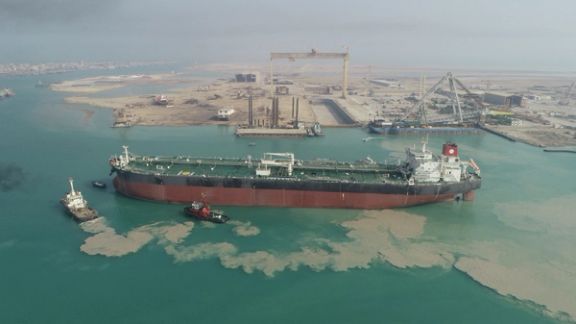
Is a United States decision to ease oil sanctions on Venezuela a precedent for dealing with Iran? Or does it reduce pressure to get more Iranian oil to market?
A move by administration of President Joe Biden to allow Chevron, the second biggest US oil company, to export Venezuelan oil followed talks beginning Saturday in Mexico between the government of President Nicolas Maduro and the opposition. Revenues currently frozen abroad will be ringfenced by the United Nations into ‘humanitarian spending.’
Battling high inflation, alongside food and medicine shortages, the Venezuelan government has said the “kidnapped” fund would go into helping stabilize the electric grid, improve education infrastructure, and improve the response to this year’s flooding. The UN will manage a fund for over $3 billion currently held by US and European banks fearful of punitive US measures.
But the decision has been criticized on several grounds. The Boston Herald in an editorial November 28 mocked Biden’s interest in “climate-destroying fossil fuels,” suggesting he was offering the Venezuelan government “a political reward” while appeasing US “eco-progressives” over US shale production, slowing as the release of US emergency reserves eases, while the December 5 deadline for tighter Russia sanctions looms.
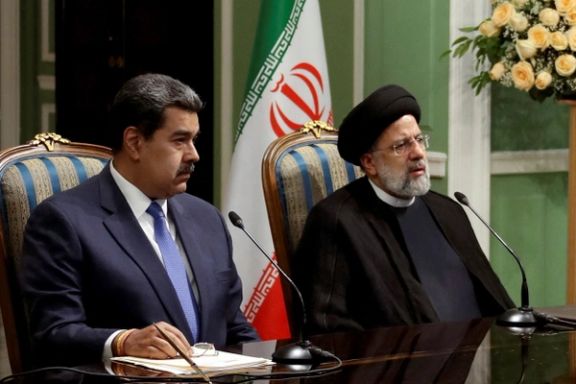
An investigation by the Reuters news agency, in a feature published Wednesday, highlighted close links between Venezuela and Iran in cooperating to evade Washington’s eagle eye on oil transports. Reuters reported super-tanker Young Yong disguising Venezuelan oil as Malaysian oil. The vessel belongs to a company owned by a Ukrainian national also sanctioned, and is one of three tankers designated November 3 by the US for forging documents to ship Tehran’s oil and so evade US sanctions on Iran.
Gaining an economic windfall
Links between Caracas and Tehran partly explain those arguing against relaxing US pressure on Maduro government and that a double standard is at play. Eddy Acevedo, an advisor at the Wilson Centre, has argued that “both rogue regimes are looking to extract concessions in hopes of gaining an economic windfall.”
Iran and Venezuela in June signed a 20-year cooperation agreement, three years after President Donald Trump in 2019 ramped up sanctions against Venezuela after Maduro won the disputed 2018 election and four years after Trump launched ‘maximum pressure’ against Iran as he withdrew the US from the 2015 Iran nuclear agreement.
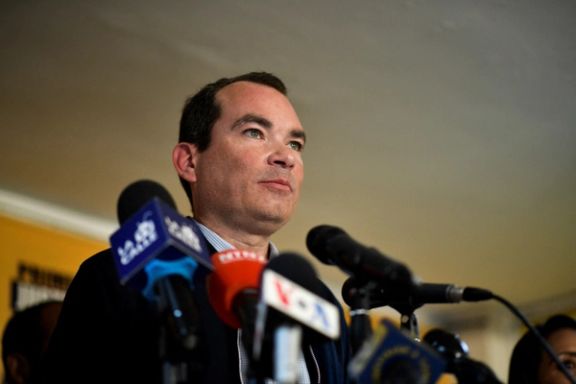
The Reuters report suggested Iran had “pioneered” the use of false documents to conceal the origins of cargoes. According to the news agency, around 200 tankers, including 82 super-tankers able to carry up to 2 million barrels, have been involved in servicing both Venezuela and Iran, with the south American country exporting over 360 million barrels in the face on US sanctions since 2019.
‘Smart’ sanctions?
Documentation in the Young Yong case were supplied to Reuters by advocacy group United Against Nuclear Iran, which has since 2013 tracked Iran’s oil traffic to “disrupt…[its] attempts to generate profits from oil sales and further isolate the regime economically.”
So, what are the implications of the Venezuela decision for US Iran policy, when Biden still aims to reach diplomatic agreement to revive the 2015 nuclear agreement? Some analysts in Tehran have argued that Europe’s need for energy in the wake of sanctions against Russia, coupled with upward pressure on US gasoline prices, increased the likelihood of Washington meeting the Iranian demands of ‘guarantees’ that have reportedly stymied talks to revive the 2015 agreement, the JCPOA (Joint Comprehensive Plan of Action).
A decision to replace blanket sanctions on Venezuela with ‘smarter’ measures could create a precedent over Iran. As the Venezuela decision loomed earlier in the month, Reuters suggested the US was looking to replace hidden oil trade, a response to sanctions, with transparent transactions. But at the same time, Venezuela pumping more oil could reduce pressure on Biden to compromise with Iran.

The Islamic Republic has sentenced four people to death for what the judiciary calls “cooperating with the Israeli intelligence service and committing kidnappings.”
Iran’s Mizan News Agency, which is affiliated with the Judiciary, said Wednesday that the four, who had been arrested back in June, have been “destroying private and public property and obtaining fake confessions.”
The Islamic Republic has long accused arch-enemy Israel of carrying out covert operations on its soil. However, it has not provided evidence to prove its claims against those who received the death penalty. Iran’s judiciary never holds such trials transparently and it is not clear if such trials have indeed been held.
Throughout the years, due process has not been implemented during political and security trials while the Islamic Republic often accuses Israel and the West of having spies in the country.
This time the identities of the accused have been announced, alleging that “with guidance from the Israeli intelligence service, this network of thugs” were committing crimes.
Israeli is believed to have been behind assassinations and acts of sabotage against Iran’s nuclear facilities, but no one was ever put on trial for these incidents.
On Wednesday, three other people were handed prison sentences of between five and 10 years for alleged crimes such as acting against national security and possessing illegal weapons.
International community and human rights organizations have repeatedly expressed concerns about Islamic Republic’s detentions, sham trials, and the death sentence for people.
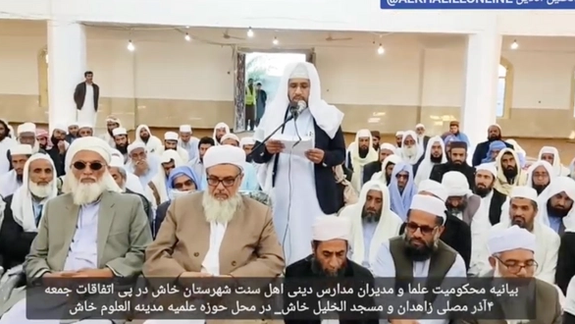
A group of Sunni religious leaders in several Baluch cities across Sistan-Baluchestan province called on the Islamic Republic to stop its repression machinery used against protesters.
In a joint video statement released on Monday, Friday prayer Imams and religious scholars from Khash, Taftan, Mijaveh and their neighboring towns decried the regime’s appalling attacks against the people of Kurdish majority cities, the killings on September 30 dubbed as ‘Bloody Friday’ in Zahedan, and a brutal crackdown of Khash residents on November 4, among others.
Protesting Islamic Republic’s violations of human rights and dignity, they said religious leaders, elders and intellectuals in the province with a unified voice condemn government’s violent reaction to protests across the country and show their “national solidarity.”
The clerics said the attacks against the people at the Grand Makki Mosque -- the largest Sunni mosque in Iran located in the center of Zahedan – and Al-Khalil Mosque in Khash, where security forces arrested many people, and similar incidents across the province are aimed at fomenting fear among the people to dissuade them from attending prayers at mosques. They denounced the strategy by the Islami Republic as “Mosquephobia,” apparently because the mosques are places where Sunni people gather to listen to their community leaders criticize the regime.
The signatories of the statement also called for "the release of all political prisoners in Iran, who were arrested during the recent protests." Noting that peaceful protest is the people's right, they also urged the authorities to address issues regarding women's rights. “The voices of the Iranian people should be heard," they added.
Emphasizing that the relentless ethnic and religious discrimination that has persisted over four decades of the Islamic Republic, the Sunni clerics expressed support for “the wise positions” of Mowlavi Abdolhamid as the serious and legitimate demands of the people.
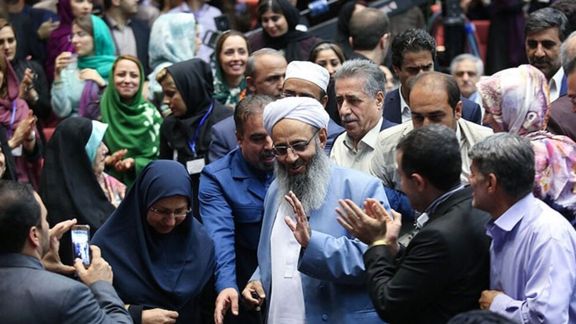
Molavi Abdolhamid, officially known as Sheikh Abdolhamdid Esmailzehi, is the most prominent religious leader of Iran's largely Sunni Baluch population living in the province. Abdolhamid's popularity is largely because of his willingness to challenge the absolute authority of Supreme Leader Ali Khamenei. Earlier in November, the outspoken Sunni Imam said women, ethnic and religious groups, and minorities have faced discrimination after the establishment of the Islamic Republic in 1979. He was also brave enough to blame Khamenei for the attack on protesters in his hometown, Zahedan, known as the Bloody Friday. It took place September 30, when security forces killed about 100 people, and injured hundreds. Earlier in the month, he called for an internationally monitored referendum, saying by killing and suppression the government cannot push back a nation.
The statement by the Sunni clergymen came a day after an audio file was leaked by the hacktivist group Black Reward, revealing the Islamic Republic’s plan to tarnish Abdolhamid’s reputation. The audio tape from a meeting between a Revolutionary Guard general and a group of media managers or representatives from outfits affiliated with the IRGC, revealed that Khamenei demanded Mowlavi Abdolhamid be warned over his comments. Qasem Qoreyshi, the deputy commander of IRGC’s paramilitary Basij forces, also said in the meeting that “We made a mistake about Abdolhamid. We first eliminated tribal leaders in the region to give more credit to Abdolhamid. However, he didn’t carry much weight [in the past].”
In a similar joint video statement released earlier in the month, Sunni religious leaders and Friday prayer Imams in Iran’s Kordestan province also called for a referendum under the supervision of international bodies. The Sunni clerics of Sanandaj and Dehgolan called for a plebiscite with the presence of religious and national leaders, as well as neutral international observers to “get out of the current situation.”